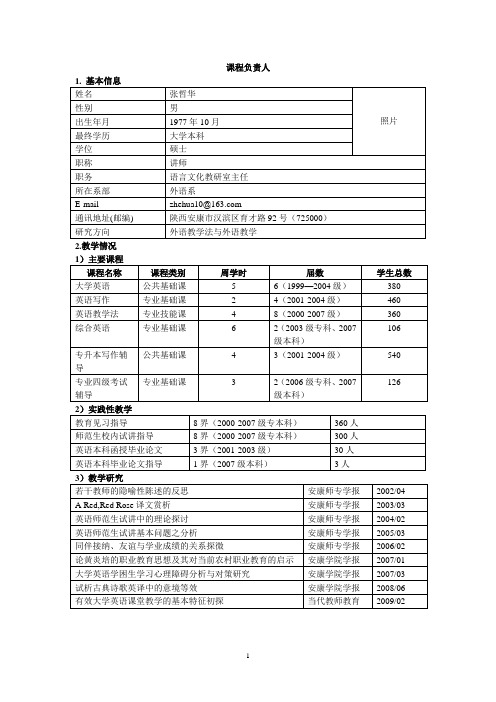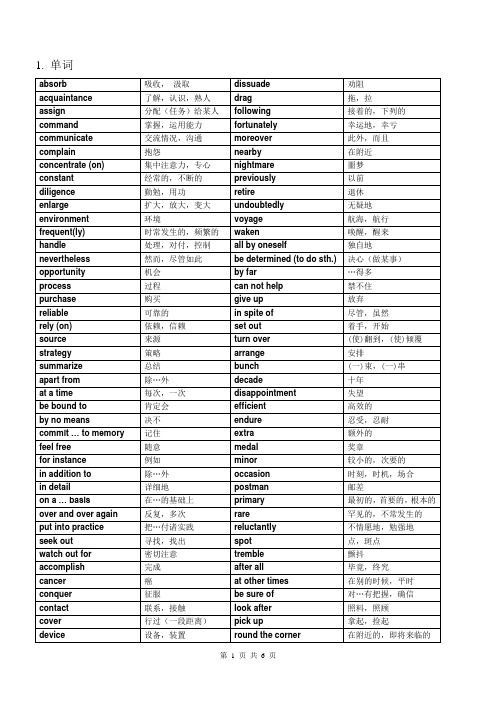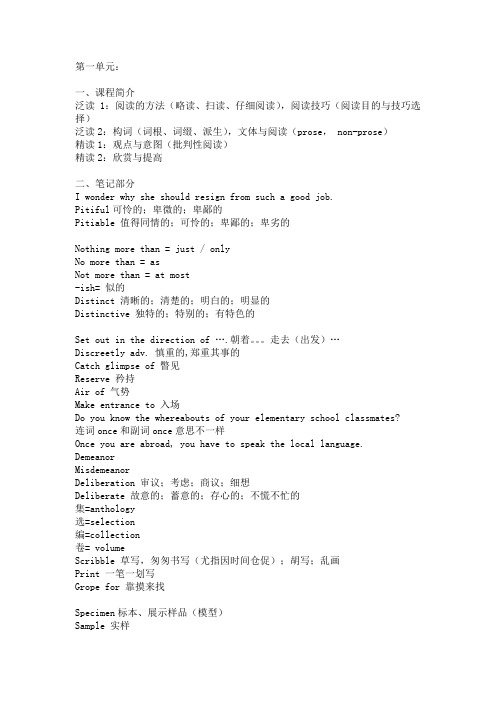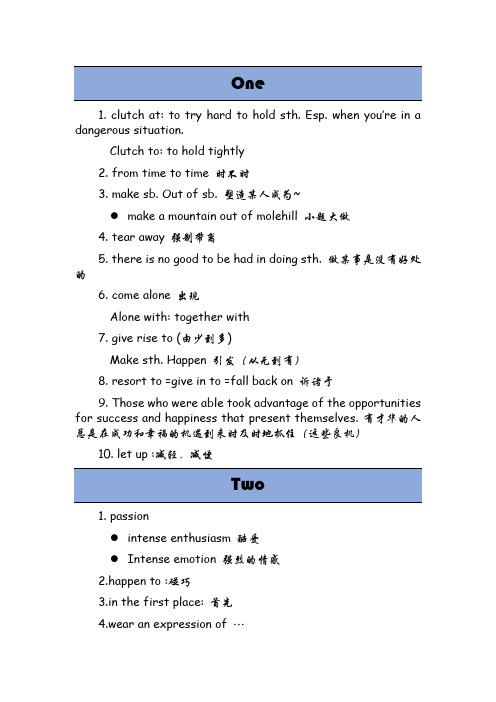大学英语精读1 -- 复习提纲
现代大学英语精读1-4册大纲及教案

课程负责人2.教学情况5)获奖情况2004年、2005年分别评为系级、校级优秀教师。
主讲教师情况1. 基本信息2.教学情况1)主要课程2)实践性教学3)教学研究4)主持和参与的教研课题5)获奖情况教学队伍情况2教学队伍整体结构情况综合英语课程是英语专业本科的主干基础课。
目前从事本课程建设和教学的教师共7人。
其中副教授2人,讲师4人,助教1人。
具有硕士学位或正在攻读硕士学位的教师5人,拥有硕士学位以上学历的教师占57%。
主讲教师的年龄35岁以下4人,35岁以上,45岁以下2人。
本课程教师队伍结构基本合理,中青年结合,随着英语本科专业的持续发展,现任的大部分青年教师在老教师的指导下,必将在教学经验、教学水平、教学艺术上取得较大进步,成长为本课程的骨干教师。
高学历人才的引进,也必将为本课程师资力量的壮大增添新的血液。
在教培养方面,将采取以下措施:1. 搞好本课程青年教师的传、帮、带工作,要求青年教师分批考研,进行业务自修;2. 鼓励中年教师和已取得硕士学位的教师承担重要科研课题,参加重要学术会议;3.正确处理教学与科研的关系,鼓励青年教师撰写教研科研论文,提高学术研究水平。
3. 教学改革与教学研究《综合英语》课程是英语本科专业的主干基础课程,在我系开设时间较短。
为了提高教学质量,改革传统的英语精读教学方法和模式,为把该课程建设为系级乃至校级重点课程,我们已做了大量工作。
首先,认真学习《高校英语专业教学大纲》,制定了《综合英语》课程教学大纲,先后学习了任务型语言教学法、交际教学法、建构主义理论等,转变教学观念和思想,探讨教学方法,交流教学经验,解决教学中存在的问题和教学难点。
其次,为确保课程教学质量,确立了集体备课、下班辅导、单元测试等制度,通过严格完善教学管理促进教学水平的提高。
第三,规范教案格式,并每学期进行教案展示。
第四,定期开展主题鲜明的教研活动,要求每位教师撰写教学心得或教改总结。
第五,每学期举行公开课、观摩课活动,为教师提供展示才华、交流经验的平台。
大学英语复习题纲

大学英语复习题纲一、词汇复习1. 重点词汇记忆:掌握本学期所学词汇,包括单词的拼写、词义、用法和例句。
2. 词组搭配:熟悉常用词组及其搭配,能够正确运用在句子中。
3. 同义词辨析:区分近义词的细微差别,提高词汇运用的准确性。
二、语法复习1. 时态:复习各种时态的构成和用法,包括一般现在时、过去时、完成时等。
2. 语态:掌握被动语态的构成和使用场合。
3. 非谓语动词:熟悉动名词、不定式和分词的用法及其在句子中的作用。
4. 从句:复习名词性从句、状语从句、定语从句等的构成和用法。
三、阅读理解1. 快速阅读:练习快速浏览文章,抓住文章主旨大意。
2. 细节理解:通过练习,提高对文章细节信息的捕捉能力。
3. 推理判断:训练根据文章内容进行逻辑推理和判断的能力。
四、写作技巧1. 写作结构:掌握英语写作的基本结构,如引言、主体和结尾。
2. 写作内容:学习如何组织文章内容,使文章条理清晰、逻辑严密。
3. 写作语言:提高语言表达的准确性和多样性,避免重复和单调。
五、听力理解1. 听力技巧:练习听力时的注意力集中和信息捕捉技巧。
2. 听力内容:熟悉不同场景下的对话和独白,提高听力理解能力。
3. 听力练习:通过听力练习题,加强对听力材料的理解。
六、口语表达1. 发音练习:纠正发音,提高语音的准确性和流畅性。
2. 口语表达:学习如何组织语言,进行流畅的口语表达。
3. 情景对话:通过模拟不同场景下的对话,提高口语交际能力。
七、翻译练习1. 英译汉:练习将英文原文翻译成中文,注意语言的准确性和地道性。
2. 汉译英:练习将中文原文翻译成英文,注意语言的准确性和表达的自然性。
八、综合应用1. 模拟考试:通过模拟考试,检验学习效果,查漏补缺。
2. 错题分析:对模拟考试中的错题进行分析,找出错误原因,避免再犯。
3. 学习策略:总结有效的学习方法和策略,提高学习效率。
九、复习建议1. 制定计划:根据自己的学习情况,制定合理的复习计划。
现代大学英语精读1-4册大纲及教案

现代大学英语精读1-4册大纲及教案现代大学英语精读1-4册大纲及教案一、教材概述《现代大学英语精读》是中国大学英语教学研究会主编的一套综合性教材,共分为1-4册,用于高校本科英语专业或非英语专业学生的英语阅读教学。
该教材的目标是培养学生的阅读能力,提升其英语交流和写作能力。
二、教学目标1. 培养学生对英语文章的阅读理解能力;2. 培养学生的英语写作能力,使其能够进行英文写作;3. 培养学生的英语听力和口语能力,提高其英语交流能力;4. 培养学生的独立学习能力,提高其自主学习能力。
三、教学内容与安排1. 《现代大学英语精读1》本册共10个单元,包括文章阅读、词汇训练、听力训练和口语训练,旨在帮助学生提高阅读理解能力和听说能力。
每个单元包括以下教学内容:- 预习导入:通过复习所学词汇和引入相关话题,激发学生学习的兴趣;- 文章阅读:学生阅读一篇有关话题的文章,并回答相关问题,培养其阅读理解能力;- 词汇训练:帮助学生学习文章中的生词和短语,并进行相关的词汇练习;- 听力训练:提供与文章话题相关的听力材料,让学生提高听力理解能力;- 口语训练:通过对话和口语练习,训练学生的口语表达能力。
2. 《现代大学英语精读2》本册共12个单元,内容包括了不同主题的文章阅读、词汇练习、听力练习和口语训练。
教学内容安排如下:- 预习导入:导入本单元的主题,激发学生兴趣;- 文章阅读:学生阅读一篇较长的英语文章,并回答相关问题,提高理解能力;- 词汇训练:学习并掌握文章中的生词和短语,进行词汇练习;- 听力训练:提供与文章话题相关的听力材料,训练学生的听力理解能力;- 口语训练:通过对话和口语练习,提高学生的口语表达能力。
3. 《现代大学英语精读3》本册共10个单元,每个单元都包括了与不同主题相关的文章阅读、词汇练习、听力练习和口语训练。
教学内容安排如下:- 预习导入:引入本单元的话题,激发学生学习的兴趣;- 文章阅读:学生阅读一篇相关主题的英语文章,提高其阅读理解能力;- 词汇训练:学习文章中的生词和短语,进行词汇练习;- 听力训练:提供与文章话题相关的听力材料,训练学生的听力理解能力;- 口语训练:通过对话和口语练习,训练学生的口语表达能力。
大学英语精读1 -- 复习提纲

3. 运用不同的词性1)evidence(明显,n.), evident(明显的,adj.), evidently(明显地,adv.)a. Do you have any evidence that Charles stole the jewels (宝石) ?b. Evidently, there is no one at home. The lights are out.c. It is evident that the elderly gentleman has been greatly hurt and will never come back to the store to samplepuddings any more.d. The old lady looked at her daughter with evident pride.2)kindness(善良,n.), kind(善良的,adj.), kindly(善良地,adv.)a. It’s very kind of you to invite me to tea.b. Would you kindly turn down the radio?c.Kindness is one of the qualities we would look for in a friend.d. The policeman treated the lost child very kindly.3)eagerness(渴望,迫切,n.),eager(渴望的,迫切的,adj.), eagerly(渴望地,迫切地,adv.)a. The old man began eagerly to sample one after another of the puddings as soon as he accepted the spoon.b. He is always eager to see new places and keen (渴望的) to meet new people.c. They looked forward to the occasion with great eagerness.d. All the children listened to the story with eager attention.4)sincerity(真挚,n.), sincere(真挚的,adj.), sincerely(真挚地,adv.)a. Was the narrator sincere in his offer to purchase a pudding for the old man?b. The narrator sincerely wished that he could take his tactless words.c. I may say in all sincerity that I did not mean to hurt you.d. Please give my sincere regards to all the members of your family.5)occasion(场合,n.), occasional(偶尔的,adj.), occasionally(偶尔地,adv.)a. We had fine weather all through July except for an occasional thunderstorm.b. Prof. Wilson’s daughter teaches at a high school in California, and she occasionally files to New York to see him.c. I can’t recall the occasion, but I did meet her before.d. In the past two years, Myra has come to see her mother only occasionally.6)surprise(使惊奇,v.), surprise(惊奇,n.), surprising(令人惊讶的,adj.), surprised(感到惊讶的,adv), surprisingly(令人惊讶地,adv.)a. I was surprised to hear that Tom had failed his exam.b. Aunt Sophia paid us a surprise visit last Sunday.c. Surprisingly our team lost for the first time in ten years.d. The news surprised all of us.e. It is not surprising that Jack got fired – he was always daydreaming at work.f. A look of surprise came into his eyes as he read the telegram (电报).7)please(使喜欢,v.), pleasure(愉快,n.), pleasant(令人愉快的,adj.), pleasing(令人高兴的,adj.), pleasantly(令人愉快地,adv.)a. I was pleasantly surprised to find it so easy to pick up new words while reading simplified novels.b. You’ll soon find it isn’t an easy job to try and please everybody in the office.c. It was particularly pleasing to be in this wild area, and to enjoy the unique feelings of peace that only mountainscan inspire.d. Dr. Wang takes great pleasure in helping children to learn painting.e. It was pleasant to sit down in the shade after standing for hours in the sun.8)admire(赞美,羡慕,v.), admiration(赞美,羡慕,n.), admirable(令人钦佩的,adj.), admiring(赞赏的,钦佩的,adj.), admired(赞美的,钦佩的,adj.), admiringly(钦佩地,羡慕地,adv.)a. All those who know him admire him for his frankness (坦白,率直).b. If our admiration is true, genuine, and progressive we will in the end come to admire the good and cease to admire the bad.c. There is nothing so admirable as a man who sacrifices his life and happiness for others.d. He never wrote entirely admiring reviews: “It’s the essence (本质) of a book never to be pe rfect,” he said, “so its writer must expect to come in for a little criticism.”e. He came into the sitting-room, where he looked round admiringly at my furniture and books.f. For twenty years, in fact, he was the most active and admired humanist(人文学者) in the world.9)astonish(使惊讶,v.), astonishment(惊讶,n.), astonishing(可惊讶的,adj.),astonished(惊讶的,adj.), astonishingly(可惊讶地,adv.)a. Lawson, while neither tactful (机敏的) nor popular, was astonishingly successful for a long period.b. She coped with the press with astonishing skill for someone who was just nineteen years old.c. To his astonishment, Judy threw her arms about him and hugged and kissed him.d. Why, Mamma, I could astonish you with a great many words you never heard in your life.e. “I work there,” he replied simply, and when he saw her astonished expression he set his glass down and began to explain.4. 中译英(translation)1. 据报道,那条铁路曾因洪水而停止修建。
精读1-unit1

第一单元:一、课程简介泛读1:阅读的方法(略读、扫读、仔细阅读),阅读技巧(阅读目的与技巧选择)泛读2:构词(词根、词缀、派生),文体与阅读(prose, non-prose)精读1:观点与意图(批判性阅读)精读2:欣赏与提高二、笔记部分I wonder why she should resign from such a good job.Pitiful可怜的;卑微的;卑鄙的Pitiable 值得同情的;可怜的;卑鄙的;卑劣的Nothing more than = just / onlyNo more than = asNot more than = at most-ish= 似的Distinct 清晰的;清楚的;明白的;明显的Distinctive 独特的;特别的;有特色的Set out in the direction of ….朝着。
走去(出发)…Discreetly adv. 慎重的,郑重其事的Catch glimpse of 瞥见Reserve 矜持Air of 气势Make entrance to 入场Do you know the whereabouts of your elementary school classmates?连词once和副词once意思不一样Once you are abroad, you have to speak the local language. DemeanorMisdemeanorDeliberation 审议;考虑;商议;细想Deliberate 故意的;蓄意的;存心的;不慌不忙的集=anthology选=selection编=collection卷= volumeScribble 草写,匆匆书写(尤指因时间仓促);胡写;乱画Print 一笔一划写Grope for 靠摸来找Specimen标本、展示样品(模型)Sample 实样Ego自我;自我价值感Cafeteria 自助餐厅;自助食堂CanteenDiner小饭店RestaurantGoodie 好吃的Puddle 水洼;小水坑;(尤指)雨水坑KetchupFlail 乱动;胡乱摆动;猛打Maneuver 演习;谨慎或熟练的动作;巧计tip倒;使翻倒topple 倒下;打倒;推翻;颠覆brigade 旅sneak 偷偷地走sneak into溜进sneak out 溜出DestinyFateDine on 以…为食,把…当饭吃AssortmentSort sorted assorted assortmentBe reserved for sbUpper classMiddle classLower classClasp 紧抱;扣环;紧握;紧攥Slink 偷偷摸摸地走;躲躲闪闪地走;溜Malicious 恶意的、恶性的Benevolent 善意的、良性的Live to do sth 能熬到做…的时候Not everyone can live to graduation.Run with the crowd = go with the wind随波逐流Law of survival生存法则Shackle 束缚Self-consciousness不安Self-conscious 怕难为情的;害羞的Try on尝试Try 试图Taste for 品味,爱好三、作业Quote 2 typical English expressions in the text that are unique to the English speaking countries and analyze them with reference to Chinese culture to show how we should learn them.Example:In the text we have the expression “shackles of self-consciousness”which means the constraints caused by one’s worries about the performance of oneself. Actually it is very difficult for us to understand the meaning of the phrase from the words that make up it. In the first place, shackles in English refer more often to the sense of constraints or limitations, while in Chinese we will automatically associate it with criminal acts. Then self-consciousness will often be misinterpreted as one’s opinions or ideas of oneself if we don’t look it up in the dictionary. Actually, this word means worries or lack of confidence in oneself. In this regard, the actual meaning should not be derived from the very literal meaning of its constituent words. Rather, we should consider the meaning of the phrase as a whole unit. The best translation of it should be something like “缺乏自信的束缚.”四、作业答案I、1.I had just the feeling of a newcomer at college2.my apparent confidence3.some food to appease my hunger and anxiety4.going with the tide was no longer crucial to one’s success5.foolish and glaring mistakesII、1.distress2.clutched3.pose4.sneaked5.preoccupation6.shackles7.curse8.deliberationIII、1.assure2.discretion3.relaxation4.humiliate5.strategy6.embarrassment7.maneuverable8.immaturitymature maturityimmature immaturitypremature 早产、早熟a premature childIV、1.live up to 达到2.headed for3.seek out sought4.has broken out rash 皮疹5.groped for6.try …on …试图7.go out to8.tipped off 举报V.1.distinct – vague/ indistinct2.discreetly = inconspicuously3.reserve = self-restraint4.dumb – clever, sensible, intelligent5.demeanor = manner, behaviorposed – excited, agitated7.slink = sneak8.naïve– mature, sophisticatedVI.caught on = became popularlook up to = respectpersist in = keep upresult in = lead tofigure out = understandhit upon = founddraw on = usekick off = start中译英1.It distressed me a great deal to hear the news that he had sufferedrepeated failures.2.He assumed an air for cheerfulness, even though he lost favor with hisboss.3.Gulliver met with extraordinary adventures and saw a strangeassortment of people.4.He will be furious with you if you repeat the same mistake.5.We were all greatly drawn by his frank views, humorous words and genialmanner.6.After cheers and applauses died down, the Nobel Prize winner began hisspeech.7.He is gifted with a sort of insight and foresight, so he rarely runswith the crowd.8.I feel realities are after all very harsh, so one can hardly live upentirely to his ideals.。
现代大学英语精读1知识点整理

1. clutch at: to try hard to hold sth. Esp. when you’re in a dangerous situation.Clutch to: to hold tightly2. from time to time 时不时3. make sb. Out of sb. 塑造某人成为~●make a mountain out of molehill 小题大做4. tear away 强制带离5. there is no good to be had in doing sth. 做某事是没有好处的6. come alone 出现Alone with: together with7. give rise to (由少到多)Make sth. Happen 引发(从无到有)8. resort to =give in to =fall back on 诉诸于9. Those who were able took advantage of the opportunities for success and happiness that present themselves.有才华的人总是在成功和幸福的机遇到来时及时地抓住(这些良机)10. let up :减轻,减慢1. passion●intense enthusiasm 酷爱●Intense emotion 强烈的情感2.happen to :碰巧3.in the first place: 首先4.wear an expression of …5.turn to 转向6.move in to●make intrusive advances toward intrude on●to attempt to seize control of7.zeroed in on●identify sth. And concentrate on it●locate target and aim at it8.interfer☞interference☞interferer●meddle in other people affairs●have undesirable effect9.shake down 敲诈10. be on the case :be in charge of or dealing of a particular crime1.barter for 物物交换2.spring up 迅速发展3.tend to 倾向4.If that kind of thing had happened when I was young, the whole village would condemned such an ungrateful son, and his father would surely have given him a good beating 虚拟语气5. But I feel a great pity for my wife. I have been forcing silence upon her all these years, yet she has not once complained of anything. 但是我对我的妻子感到抱歉,我这些年我一直对她沉默寡言,而她却从未抱怨过什么6.tie sb. Down 束缚某人1.for want of =lack of =be short of =be lacking in缺少,缺乏2. be something of n. 在一定程度上3.in return(for) 作为回报4.linger on●逗留,徘徊●持续●打发时间5.deny☞denial 否认1.now and then 有时2.turn up: find or to be found,appear3.keen:●characterized by strength and distinctness ofperception 洞察●extremely sensitive or responsive●having or showing great mental penetration or acumen1.give in : unwillingly agree2.at heart: in one’s deeply feelings3.supply sb. with sth.4.at length:●fully comprehensively 非常全面的⇨反义brief●at last, finally⇨反义immediately5.read A into B。
最新现代大学英语精读第一册 Lesson3教学提纲

Lesson Three Message of the LandTeaching Objectives:A.To know the background information about the author, and the style of this text.B.To acquire the key words, important and difficult sentences and language pointsC.To understand and master the usage of the basic rhetorical devices: simile andmetaphorD.To understand the connotation of the title and main idea of the text. Teaching Procedure:I.Pre-task1. Warm upIndividual questions:●The title “Message of the Land’ means that land can convey something to people.Then what does land convey to people, or what role does land play in people’s daily life in your mind?●What is people’s attitude to land nowadays?2. Background information:The author:Pira Sudham(1942~)is an English writer in Thailand . He was born in a poor family in rural Esarn, in the northeast of the country. At the age of 14, he traveled to Bangkok to become a temple boy, a servant to the monks. He continued to study and won entrance to Thailand’s top University, Chulalongkorn. He later won a New Zealand government scholarship which allowed him to travel from New Zealand to Australia, China’s Hong Kong and Europe. Pira Sudham never forgets Esarn, where he experienced poverty and injustices in his early years, and which became the background for many of his short stories and novels. His novel Monsoon Country made him a nominee for the 1990 Nobel Prize for the literature. This text is adapted from the farmer and his wife in guidebook to better reading series published in 1982. The city: BangkokBangkok, population 8,538,610 (1990), is the capital and largest city of Thailand. The city is located on the east bank of the Chao Phraya River, near the Gulf of Thailand. Bangkok is one of the fastest-growing, most economically dynamic and socially progressive cities in Southeast Asia. Local people like to think that it is emerging as a regional centre to rival Singapore and Hong Kong, but it suffers from major infrastructure and social problems as a result of its rapid growth. It is also one of the world's most popular tourist destinations.Bangkok is the economic center of Thailand. The Chao Phraya River allows Bangkok to function as a port. The Stock Exchange of Thailand is located in Bangkok. Tourism is a major source of revenue. The city contains many Buddhist temples (known in Thai as Wats), among the best known being Wat Pho and Wat Arun. Thailand BuddhismBuddhism is Thailand's main religion. 94% of Thai people are Buddhist. The other are Muslim, Catholic or Chinese. Buddhism was born 2,546 years ago (the official year in Thailand is the year 2003 and the traditional year is the year 2546). Buddhism is linked with the historical Indian prince, Siddharta Gautama, who became the Buddha and reached the enlightenment. Now his teachings are still followed. His teachings say that people suffer because they are attached to material things, to women or men by heart links. These links cause suffer, jealousy so pain. People are never satisfied, i.e. they want more money, more power. The aim of Buddhism is to get rid of these pains and of these links. There are several kinds of Buddhism. Thai Buddhism is called Theravada Buddhism.Quote from the author:The following is a part of the author’s remarks, based on which we can have a glimpse of the poor of Tailand.“If I had not left my village then, I would have been subject like most villagers, to the mercy of nature: floods, drought, disease, ignorance and scarcity. With endurance, I would have accepted them as my own fate, as something I can not go against in this life.”II. Task cycle:Theme of the text:The text tells about the deep regret of the old people over the loss of traditional values and the way of life.Structure of the text:The text can be divided into two parts:Part I (paras 1-7): about the interview of wife.Part II: (paras. 8—11) about the farmer’s speechIn-class discussion:Question: What kind of writing does this text belong to?Answer: This text is an essay in a very broad sense of the word, or rather an interview.It is written down by the writer who interviewed a farmer and his wife.(Since the World War II it has become popular for writers to interviewpeople, record what they say and, after some, not too much, editing, publishthese people’s stories in book form.)Question: What are stylistic features of essay?Answer: Generally speaking, the style of essay is colloquial. The language is straightforward. The sentences are short and words are small and easy,which help readers to understand what’s going on.Questions in mind:●What do we learn from the old couple in the interview? What are theircharacteristics?●What problems does the old couple meet with?●What is the root of the problem?●Are there any effective ways to solve the problem?Detailed study of the Text:1). They belonged to my parents and forefathers. (para1)to belong to sb: to be owned by sb.“Yes, these are our rice fields. They belonged to my parents and forefathers. The land is more than three centuries old.”Question: In the first paragraph,why does the wife start her conversation with the talk about the land?Answer: The wife has already regarded the land as part of her life. This is the land where her parents and forefathers lived and it is bound with family historyand tradition. It represents the root of her family.2). …it was I who stayed with my parents till they died. (para1)Sentence structure: the emphatic structure.Pattern: it is \was …that\who…Function: to emphasize some parts in a sentence,e.g. the subject.It was the policeman that/who caught a pickpocket on No. 933 bus yesterday.e.g. the object.It was a pickpocket that the policeman caught on No. 933 bus yesterday.e.g. the adverbialIt was on No.933 bus that the policeman caught a pickpocket yesterday. (the adverbial of place)It was yesterday that the policeman caught a pickpocket on No. 933 bus. (the adverbial of time)Task: Make sentence according to each pattern3). My husband moved into my house as is the way with us in Esarn. (para 1) “As” introduces a defining relative clause, and functions as its subject, representing what is stated in the main clauses.More examples:⏹As is known to all, Taiwan belongs to China. (as-----subject of the clause)⏹As is often the case, the boy was late for class. (as-----subject of the clause) Question: What is the cultural connotation in this sentence?Answer: When we got married) my husband came to live in our house. It was the tradition here in Esarn that the bridegroom should come to live with the bride’s family.4). The rest, two boys and two girls, went away as soon as we could afford to buy jeans for them. ( para 1)the rest (of sth): the remaining people or things; the otherse.g. 其中一本书比较难,其他的简单。
大学英语精读1Lesson 1 知识要点

overlook vt.
a. to have a view of sth. from above 俯瞰,远眺 b. to fail to see or notice; pay no attention to 没有注意到,忽略 Examples: Our room overlooks the ocean. 从我们的房间可以远眺大海. 从我们的房间可以远眺大海 I’m afraid I overlooked your name; I’ll add it to the list immediately. 抱歉我漏了你的名字; 我马上就加进名单里. 抱歉我漏了你的名字 我马上就加进名单里 I’ll overlook your mistake this time. 这次你的错误忽略不记. 这次你的错误忽略不记
3
Para. 17-20 At the end of school day: everything has changed!
Language Study
Para. 1-7
Language and Details
Clutch (L1, Para 1) hold tightly, usu. in fear, anxiety, or pain esp. Synonyms because you are frightened, in pain, or do not want to hold lose something 抓紧,攫住 seize grip Silent and pale, the girl clutched (to/onto) her mother’s chest. grasp 这个苍白安静的小女孩紧紧地靠在母亲胸前 grab A drowning man will clutch at a straw. snatch
- 1、下载文档前请自行甄别文档内容的完整性,平台不提供额外的编辑、内容补充、找答案等附加服务。
- 2、"仅部分预览"的文档,不可在线预览部分如存在完整性等问题,可反馈申请退款(可完整预览的文档不适用该条件!)。
- 3、如文档侵犯您的权益,请联系客服反馈,我们会尽快为您处理(人工客服工作时间:9:00-18:30)。
3. 运用不同的词性1)evidence(明显,n.), evident(明显的,adj.), evidently(明显地,adv.)a. Do you have any evidence that Charles stole the jewels (宝石) ?b. Evidently, there is no one at home. The lights are out.c. It is evident that the elderly gentleman has been greatly hurt and will never come back to the store to samplepuddings any more.d. The old lady looked at her daughter with evident pride.2)kindness(善良,n.), kind(善良的,adj.), kindly(善良地,adv.)a. It’s very kind of you to invite me to tea.b. Would you kindly turn down the radio?c.Kindness is one of the qualities we would look for in a friend.d. The policeman treated the lost child very kindly.3)eagerness(渴望,迫切,n.),eager(渴望的,迫切的,adj.), eagerly(渴望地,迫切地,adv.)a. The old man began eagerly to sample one after another of the puddings as soon as he accepted the spoon.b. He is always eager to see new places and keen (渴望的) to meet new people.c. They looked forward to the occasion with great eagerness.d. All the children listened to the story with eager attention.4)sincerity(真挚,n.), sincere(真挚的,adj.), sincerely(真挚地,adv.)a. Was the narrator sincere in his offer to purchase a pudding for the old man?b. The narrator sincerely wished that he could take his tactless words.c. I may say in all sincerity that I did not mean to hurt you.d. Please give my sincere regards to all the members of your family.5)occasion(场合,n.), occasional(偶尔的,adj.), occasionally(偶尔地,adv.)a. We had fine weather all through July except for an occasional thunderstorm.b. Prof. Wilson’s daughter teaches at a high school in California, and she occasionally files to New York to see him.c. I can’t recall the occasion, but I did meet her before.d. In the past two years, Myra has come to see her mother only occasionally.6)surprise(使惊奇,v.), surprise(惊奇,n.), surprising(令人惊讶的,adj.), surprised(感到惊讶的,adv), surprisingly(令人惊讶地,adv.)a. I was surprised to hear that Tom had failed his exam.b. Aunt Sophia paid us a surprise visit last Sunday.c. Surprisingly our team lost for the first time in ten years.d. The news surprised all of us.e. It is not surprising that Jack got fired – he was always daydreaming at work.f. A look of surprise came into his eyes as he read the telegram (电报).7)please(使喜欢,v.), pleasure(愉快,n.), pleasant(令人愉快的,adj.), pleasing(令人高兴的,adj.), pleasantly(令人愉快地,adv.)a. I was pleasantly surprised to find it so easy to pick up new words while reading simplified novels.b. You’ll soon find it isn’t an easy job to try and please everybody in the office.c. It was particularly pleasing to be in this wild area, and to enjoy the unique feelings of peace that only mountainscan inspire.d. Dr. Wang takes great pleasure in helping children to learn painting.e. It was pleasant to sit down in the shade after standing for hours in the sun.8)admire(赞美,羡慕,v.), admiration(赞美,羡慕,n.), admirable(令人钦佩的,adj.), admiring(赞赏的,钦佩的,adj.), admired(赞美的,钦佩的,adj.), admiringly(钦佩地,羡慕地,adv.)a. All those who know him admire him for his frankness (坦白,率直).b. If our admiration is true, genuine, and progressive we will in the end come to admire the good and cease to admire the bad.c. There is nothing so admirable as a man who sacrifices his life and happiness for others.d. He never wrote entirely admiring reviews: “It’s the essence (本质) of a book never to be pe rfect,” he said, “so its writer must expect to come in for a little criticism.”e. He came into the sitting-room, where he looked round admiringly at my furniture and books.f. For twenty years, in fact, he was the most active and admired humanist(人文学者) in the world.9)astonish(使惊讶,v.), astonishment(惊讶,n.), astonishing(可惊讶的,adj.),astonished(惊讶的,adj.), astonishingly(可惊讶地,adv.)a. Lawson, while neither tactful (机敏的) nor popular, was astonishingly successful for a long period.b. She coped with the press with astonishing skill for someone who was just nineteen years old.c. To his astonishment, Judy threw her arms about him and hugged and kissed him.d. Why, Mamma, I could astonish you with a great many words you never heard in your life.e. “I work there,” he replied simply, and when he saw her astonished expression he set his glass down and began to explain.4. 中译英(translation)1. 据报道,那条铁路曾因洪水而停止修建。
It was reported that the building of the railway had been held up by a flood.2. 罢工结束,资方接受了工人的要求。
The strike resulted in the management is accepting the worker’s demands.3. 煤矿工人们决定为争取更好的工作条件举行罢工。
The coalminers decided to go on strike for better working condition.4. 我很想买这本英文词典,遗憾的是我身上带的钱不够。
